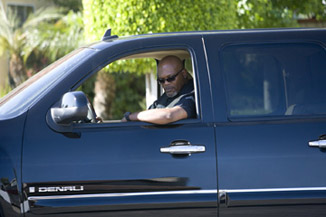Movie Review: Lakeview Terrace
By Matthew Huntley
October 2, 2008
BoxOfficeProphets.com

The set up is familiar but promising: an interracial couple - a white man, Chris (Patrick Wilson), and a black woman, Lisa (Kerry Washington) - move next door to a hard-knuckled, no-nonsense neighbor in the tranquil hills above Los Angeles. The neighbor, who keeps a watchful eye, is Abel Turner (Samuel L. Jackson), a widower with two kids, Celia (Regine Nehy) and Marcus (Jaishon Fisher). From the beginning, the movie sees Abel as militaristic and strict. He's constantly telling his kids how to dress, how to talk and who to talk to. His is a bad side you don't want to be on.
How appropriate, then, that Abel is a member of the LAPD. He uses the skills of his job to intimidate Chris because, deep down, he has a problem with a white man being married to a black woman. Later on, we learn why.
Things start out relatively harmless, like when Abel issues Chris a friendly parking ticket, but they soon get out of hand. Abel refuses to turn off the security light that shines through Chris and Lisa's bedroom, and he purposefully tells Lisa about her husband's secret smoking habit. Part of this is payback for when Chris and Lisa had a sexual rendezvous in their swimming pool, which was in plain sight for Abel's kids to see.
During its first half, Lakeview Terrace builds dramatic tension from all four corners and we're interested in each conflict, not only between Chris and Abel, but also between Chris and Lisa. David Loughery and Howard Korder's screenplay, from a story by Loughery, gives the characters intelligent dialogue to speak and explores such themes as police corruption; young couples making life-altering decisions and discovering their marriage isn't perfect; and the unfortunate side effects of interracial romance. Samuel L. Jackson gives one of his best performances in years and we're genuinely threatened by him. There's just something intimidating and unsettling about the way he stands over people to prove a point. Maybe it's because he's so tall.
But the second half is when the movie starts to wander and bails on its own issues. For instance, there's a subplot about Lisa's desire to have a baby. Chris says he's not ready and would rather wait until things settle down. The two fight and exchange accusations, and we're interested in what they have to say, but it ultimately goes unresolved. We can guess what will happen, but are Chris' accusations against his wife valid? The movie doesn't fully answer this question. It avoids dealing with its penetrating issues by simply making Abel the bad guy and blaming everything on him. Why couldn't Abel make a point every now and then so the difference between him and his neighbors wasn't so, well, black and white? That would have at least made the movie more interesting.
The director is Neil LaBute (In the Company of Men) and he gives the movie a flowing rhythm and air of authenticity, with the exception of the perfunctory ending. I also admired his technique for centering the drama around the threat of brush fires spreading to the characters' homes. The temperature rises, tension goes up and everyone is put on edge.
I was reminded of Spike Lee's Do The Right Thing, which also featured Jackson, about a summer hot spell in Brooklyn that erupted in chaos, violence and death. But whereas Lee's film was wiling to go the distance and advise us about the dangers of racism and intolerance, Lakeview Terrace seems to merely use these as devices, or ways to lure us in. Don't get me wrong, they're effective at the time, but because they don't go anywhere, such a strategy feels cheap. The movie had several intriguing set ups but no meaningful payoffs, and by the time the ending came around, I felt cheated.
I give the filmmakers credit for trying to make Lakeview Terrace more than just a standard thriller, but I can't help but think of it as a wasted opportunity. They seemed too afraid to take a stance on the issues they proposed. Why bring them up if they're not going to take a position on them?
This movie is an example of when the individual scenes are better than the whole. Not all the pieces fit but the filmmakers force them together anyway. The result is somewhat of a mess, but the actors and production make it interesting and tolerable, although it's not worth recommending. I'd tell the filmmakers to go back and make three different movies out of the one they have now and concentrate on fully seeing each story through, because each is a good one.